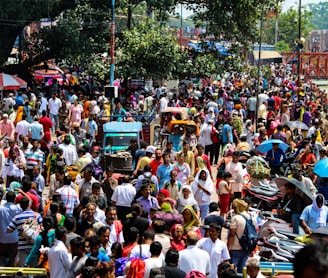India - A land of many contrasts
It is difficult to comprehend the enigma that is India. Is it a nation on the cusp of glory or is it one that is on the brink of civic collapse?
Utkarsh Sharma
10/15/20232 min read
The dichotomy is unmissable.
While the nation is celebrating arguably one of the most prosperous times after independence, it is impossible to ignore the mismatch between the country's ambitions to stand shoulder to shoulder with developed nations and its willingness to address its multiplying civic problems.
Yes, the country has conquered the moon and presided over the G20 group. Yet it has not been able to find long term solutions to basic civic issues. The most visible amongst these is waste (mis)management. There is no clear roadmap to process the heaps of waste that the country generates on a daily basis. Roadsides even in urban localities are littered with all kinds of hazardous and non-hazardous waste while the local government bodies and the contracted agencies bicker over accountabilities and responsibilities. The situation is worse in semi-urban and rural areas. The most scenic of the hills and the best of the beaches are littered with non-decomposable waste. 'Swachh Bharat Abhiyan', despite being wholeheartedly promoted by the upper echelons of the government, has performed below par. Beyond the noise, slogans and chest-thumping, the nation is staring at a waste problem of catastrophic proportions.
Another glaring inconsistency between the needs and wants of the general public and what the legislature and the executive are delivering is the seasonal waterlogging in cities and towns of all sizes in the country. Since time immemorial, local authorities have been, rather unsuccessfully, pumping both promises and funds towards establishing basic drainage system in the country. It is pure shame that this effort is still on even after 75 years of independence. An hour of rain is enough to deluge even the NCR, the poster boy of India's march towards development. That people die of electrolocation every monsoon is a testimony to the incompetence of all the departments involved. In a fair world, the accountable local bodies / departments should be charged with criminal negligence even for a single preventable death. The changing climatic conditions will only make the situation worse and leave people exposed to the vagaries of weather.
On similar lines is the situation of Indian transport network. Though it's heartening to see tremendous expansion in primary transport infrastructure, there is abysmally low focus on the supporting secondary infrastructure. It's no surprise that the country frequently tops the list of most road accidents (per year) in the world. Malfunctioning streetlights, improper or missing signage, inadequate road surveillance, ill-equipped system to penalize rule violators, perennial problem of potholes, non-existent drainage, shoddy repair work, etc. More can be added to the list to drive home the fact that the country is nowhere near developed countries when it comes to providing an all-inclusive (primary + secondary) transport network to its citizens.
The most unfortunate part of the equation is that we as citizens of India have accepted the status quo. We have learnt to live in filthy surroundings. We have accepted to walk & drive in knee-deep water. We have turned apathetic to the countless deaths and maimed bodies that our murderous roads deliver year after year. This should change.
The solution, I believe, will not come either from the government or the private players in the game. It is we, the citizens of the country, who will have to take the bull by its horns and think about solutions to the problems that we face on a daily basis. It is we who will have to make our country a better place.


